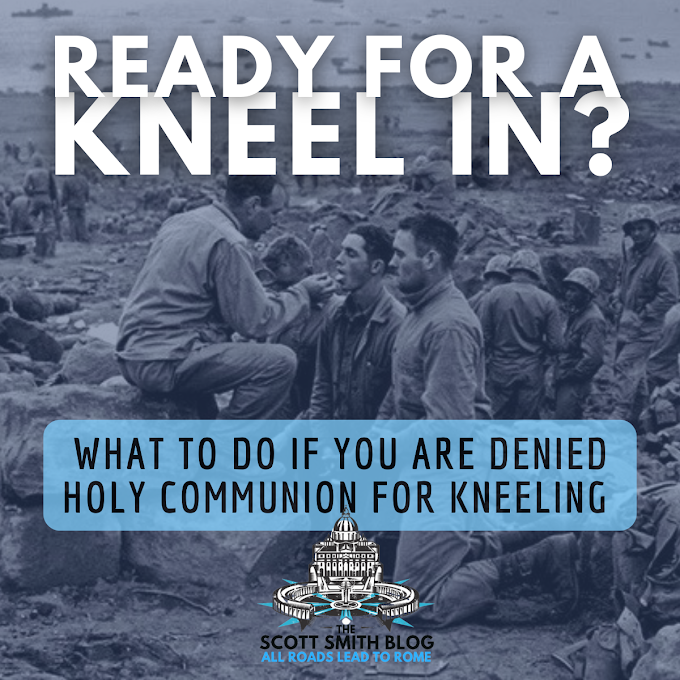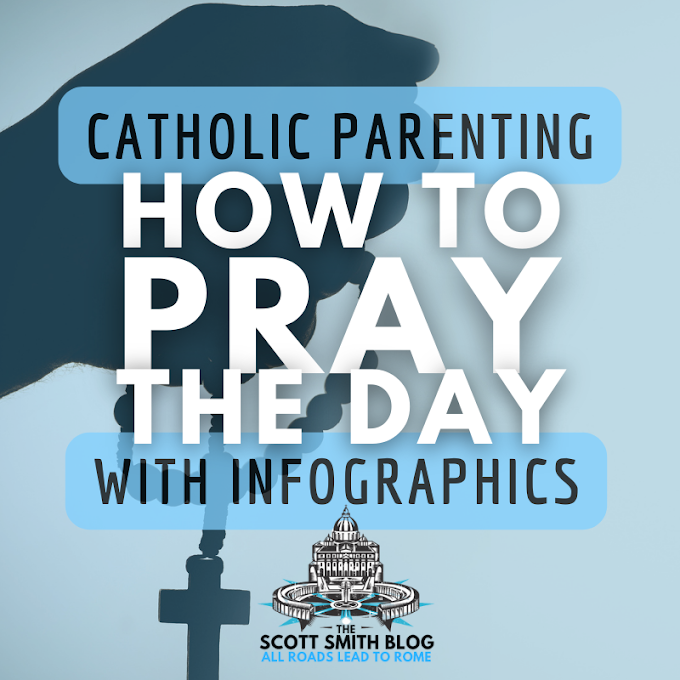I love finding myself in conversations with Protestants about Biblical proof for Transubstantiation and the Real Presence of Jesus in the Eucharist. I'm currently going back-and-forth with a Protestant in the comments of this article.
Jesus says at John 6:53-54: "Amen, Amen, I say to you, unless you eat the flesh of the Son of man and drink his blood, you have no life in you; he who eats my flesh and drinks my blood has eternal life, and I will raise him up at the last day."
Memorize that verse! It's Biblical proof for the Real Presence of Jesus in the Eucharist. It's not proof-texting, either -- the whole Bread of Life Discourse of John 6 reinforces this literal interpretation, too.
First off, Other "Amen, Amen" Statements in the Bible -- Vow Language
The double "Amen" is used for OATHS throughout the Bible. Take a look at these other examples: Numbers 5:22; Deuteronomy 27:15–26; Nehemiah 5:13; 8:6; and 1 Chronicles 16:36
Now, take a look at all these "Amen, Amen" statements in the Gospel of John.
The vast majority--if not all--should be interpreted literally. So why do Protestants interpret all of these "Amen, Amen" statements literally EXCEPT the ones about the Eucharist? Interesting.
To Nathanael in Galilee
- 1:51 – And he said to him, "Amen, Amen, I say to you, you will see heaven opened, and the angels of God ascending and descending upon the Son of man."
To Nicodemus in Jerusalem
- 3:3 – Jesus answered him, "Amen, Amen, I say to you, unless one is born anew, he cannot see the kingdom of God."
- 3:5 – Jesus answered, "Amen, Amen, I say to you, unless one is born of water and the Spirit, he cannot enter the kingdom of God."
- 3:11 – "Amen, Amen, I say to you, we speak of what we know, and bear witness to what we have seen; but you do not receive our testimony."
To the Jews in Jerusalem after a Sabbath Healing:
- 5:19 – Jesus said to them, "Amen, Amen, I say to you, the Son can do nothing of his own accord, but only what he sees the Father doing; for whatever he does, that the Son does likewise.
- 5:24 – "Amen, Amen, I say to you, he who hears my word and believes him who sent me, has eternal life; he does not come into judgment, but has passed from death to life."
- 5:25 – "Amen, Amen, I say to you, the hour is coming, and now is, when the dead will hear the voice of the Son of God, and those who hear will live."
To the Crowds in Galilee after the Multiplication of the Loaves:
- 6:26 – Jesus answered them, "Amen, Amen, I say to you, you seek me, not because you saw signs, but because you ate your fill of the loaves."
- 6:32 – Jesus then said to them, "Amen, Amen, I say to you, it was not Moses who gave you the bread from heaven; my Father gives you the true bread from heaven."
- 6:47 – "Amen, Amen, I say to you, he who believes has eternal life. 48 I am the bread of life."
- 6:53 – So Jesus said to them, "Amen, Amen, I say to you, unless you eat the flesh of the Son of man and drink his blood, you have no life in you; 54 he who eats my flesh and drinks my blood has eternal life, and I will raise him up at the last day."
To the Jews in Jerusalem at the Feast of Tabernacles:
- 8:34 – Jesus answered them, "Amen, Amen, I say to you, every one who commits sin is a slave to sin."
- 8:51 – "Amen, Amen, I say to you, if any one keeps my word, he will never see death."
- 8:58 – Jesus said to them, "Amen, Amen, I say to you, before Abraham was, I am."
To the Pharisees in Jerusalem after the Healing of the Man Born Blind:
- 10:1 – "Amen, Amen, I say to you, he who does not enter the sheepfold by the door but climbs in by another way, that man is a thief and a robber; 2 but he who enters by the door is the shepherd of the sheep."
- 10:7 – So Jesus again said to them, "Amen, Amen, I say to you, I am the door of the sheep."
To the Disciples after the Entry into Jerusalem:
- 12:24 – "Amen, Amen, I say to you, unless a grain of wheat falls into the earth and dies, it remains alone; but if it dies, it bears much fruit."
To the Disciples after the Washing of the Feet:
- 13:16 – "Amen, Amen, I say to you, a servant is not greater than his master; nor is he who is sent greater than he who sent him."
- 13:20 – "Amen, Amen, I say to you, he who receives any one whom I send receives me; and he who receives me receives him who sent me."
- 13:21 – When Jesus had thus spoken, he was troubled in spirit, and testified, "Amen, Amen, I say to you, one of you will betray me."
To Simon Peter at the Last Supper:
- 13:38 – "Amen, Amen, I say to you, the cock will not crow, till you have denied me three times."
To all the Disciples at the Last Supper:
- 14:12 – "Amen, Amen, I say to you, he who believes in me will also do the works that I do; and greater works than these will he do, because I go to the Father."
- 16:20 – "Amen, Amen, I say to you, you will weep and lament, but the world will rejoice; you will be sorrowful, but your sorrow will turn into joy."
- 16:23 – "Amen, Amen, I say to you, if you ask anything of the Father, he will give it to you in my name."
To Simon Peter after the Resurrection:
- 21:18 – "Amen, Amen, I say to you, when you were young, you girded yourself and walked where you would; but when you are old, you will stretch out your hands, and another will gird you and carry you where you do not wish to go."












6 Comments
This is your friendly neighborhood debate opponent just noticing this article on my way into our discussion elsewhere. I hate to be a fly in your soup and bother you further, but if you don't mind, I'll make this one comment here and go no further even if you reply, since we're in dialogue on another page.
You seem to convey a confidence that thinks your adversaries are left speechless by what you submit
(i.e., Protestants find [these things] hard to answer").
Let me assure you, those armed with the facts, do not find your reasoning hard to answer...AT ALL.
Now at the top of the page you advise to memorize J-6-53 because it is ipso facto, "biblical proof for the Real Presence of Jesus in the Eucharist."
No it isn't. As a matter of fact, Jesus would be the first one to DENY his real presence in a crumb of bread and drop of wine because he was unequivocal about his real, physical presence... "GOING AWAY"...
no less than 10 times. I trust you know the verses, but they seem to have no impact. That's understandable if it's God's intention to keep your spiritual eyes shut, something he's promised to do with a great part of humanity for his own good reasons (John 9:39). So let's look at what you OMITTED to say about this verse:
"Amen, Amen, I say to you, unless you eat the flesh of the Son of man and drink his blood, you have no life in you; he who eats my flesh and drinks my blood has eternal life, and I will raise him up at the last day."
What you fail to do in coming to a correct interpretation is to compare Scripture with Scripture (1 Cor 2:13). And when we do, we see the DUAL acts of eating and drinking are the direct parallel to the SINGLE act of “believing”.
Why? Because both produce the same result: namely, eternal life!
In John 6:35, 6:40 & 6:47, we read that believing in him results in eternal life. When compared with verses 51 and 54, we learn that eating his flesh and drinking his blood does likewise.
* Stated in plain language: “everyone who sees the Son and believes on him, shall have everlasting life, and I will raise him up on the last day” (6:40).
* Stated in metaphorical language: “whoso eateth my flesh and drinks my blood, hath eternal life, and I will raise him up at the last day” (6:54).
Your theology fails because what Jesus states literally in vs. 40, he states metaphorically in vs. 54.
The identical result of being raised on the last day in both verses merely intensifies his main point to believe in him, this time, through an act of metaphor.
Catholics object by using a term that's spreading like wildfire these days, and that term is “doubles down”. As we discussed before, the papal army argues that since the Lord “doubles down” by emphasizing the eating of his flesh so many times, he must have been speaking literally.
However, this conclusion cannot stand because while it's true he “doubled down” five times on the “eating” aspect in verses 53-57, Catholics are blind to the fact he also “doubles down” five times on believing in him! (in verses 29, 35, 40, 47, 64).
Consequently, your insistence that someone must be speaking literally when they “double down” on something, is erroneous. Rather, it appears each time the highly evocative language of eating his flesh is used, they are meant to correlate to (and be the metaphorical equivalent of)
believing in him...which THEY DID NOT (6:29, 36 & 64).
Ergo, these are merely two ways of saying the same thing! It's that simple.
Having only ONE thought in mind and phrasing it in two different ways, was mentioned 5 other times leading up to John 6 (!!!).
*** “Lazarus sleepeth, but I go to awake him out of sleep”.
The disciples said not to bother, let him enjoy his rest. But the Lord replied, “Lazarus is dead”.
Lazarus was either asleep or he was dead, not both.
*** The disciples told Jesus to eat something, but he replied,
“I have food to eat that you don't know about”. They wondered who gave it to him. The Lord said that the “food” he had in mind to “eat” was doing the will of God and to finish the work he was sent for. Thus, he was either speaking about eating real food, or doing the will of the Father, not both.
*** Nicodemas was told he needed to be “born again” physically, or be born again spiritually, not both.
*** The woman at the well was offered either a drink of physical water, or the “living water” of the indwelling Spirit, not both.
*** He wanted the Jews to either believe he could rebuild the temple in three days, or to believe on him as the Messiah, not both.
Therefore, since all these examples are in the gospel of John, proper biblical exegesis demands that in John 6, Jesus wants us to either eat his actual flesh or to believe in him,
NOT BOTH!
So you're certainly not in a position to teach on the matter, having rejected the Lord's command to take BOTH elements, and foolishly think the magisterium's mutilation of the Lord's Supper down to only one kind will receive a crown on Judgment Day.
Think again.
The meltdown of those Harris supporters going into fits of frenzy over her loss, will exactly be the Catholic reaction on Judgment Day when you're confronted with his eyes of fire (Rev 19:12) melting your belief system into a puddle of water.